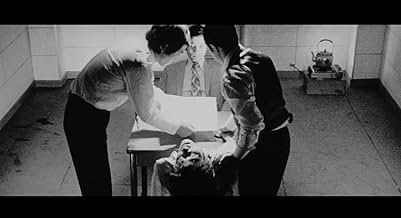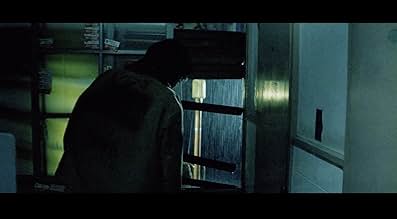IMDb RATING
6.3/10
1.8K
YOUR RATING
Once again on the lam, Matsu is helped by a strip club worker who holds a grudge against the detective who's trying to find her.Once again on the lam, Matsu is helped by a strip club worker who holds a grudge against the detective who's trying to find her.Once again on the lam, Matsu is helped by a strip club worker who holds a grudge against the detective who's trying to find her.
Featured reviews
This begins well enough and has enough going on, a male helper this time, to maintain the interest until the most exciting scenes come along. It is a good idea that Meiko's seeming saviour here has had history with the police already from his days of 60s student rebellion. Flashbacks enable stand-in director Hasebe to double his violent police demonstrations with current and b/w past. This is number four in the series, however, and needed more not less in the way of interesting action and visuals. Gone are the stylish sequences and gone the surrealism. The endings, both false and actual are fun and if this is a disappointment it is no disgrace and while not the greatest of finales, probably a much better fourth episode than many might have expected. Worth seeing.
The fourth and final of the brilliant original "Sasori" films with the unrivaled Meiko Kaji, "Joshuu Sasori: 701-gô urami-bushi" aka. "Female Prisoner Scorpion: 701's Grudge Song" was directed by Yasuharu Hasebe instead of genius director Shunya Ito, who had directed the three ingenious predecessors. Even this fourth "Sasori" flick does not quite reach the brilliance of its predecessors (all three of which are unique and unrivaled masterpieces of Exploitation cinema), "Grudge Song" still outshines almost any other film of the WIP ("Women In Prison") sub-genre by a thousand times. What makes this a little less brilliant than its predecessors is probably the replacement of Shunya Ito as a director. Ito had a great passion (and a great talent) for the use of surrealism, and Yasuharo Hasebe obviously preferred to use these elements to a lesser extent. The first three "Sasori" films were THE proof that making Exploitation and Art-house cinema at the same time was possible, and while "Grudge Song" still is a wonderful example of Exploitation-Art, it does not quite live up to the brilliance of the iconic original "Joshuu 701-gô: Sasori" and the ingeniously surreal sequels "Jailhouse 41" and the third masterpiece "Beast Stable", which is arguably the greatest of them all. Nevertheless, this fourth "Sasori" film is an absolute must-see for any fan of Exploitation and serious lover of film in general, that delivers pure brilliance in many aspects.
While Meiko Kaji's character Nami Matsushima aka. "Sasori" was mainly looking for revenge in the first film, the films become more and more political throughout the series. "Grudge Song" is again full of social criticism and broaches issues such as poverty, police brutality, rebellion and the death penalty. The film once again features a lot of violence, as well as very artistic elements. The beautiful Meiko Kaji once again brilliant in the role of Sasori, I just cannot praise this great actress enough. The rest of the performances are also great, and the the film once again has "Urami-Bushi", which Kaji sings, as the main theme song. The photography is also amazing, the film is visually stunning throughout its 89 minutes.
Though it doesn't quite reach the brilliance of its predecessors "Grudge Song" is definitely also an excellent slice of Exploitation-Art and a must-see for every serious lover of cult-cinema in general and J-Exploitation in particular.
While Meiko Kaji's character Nami Matsushima aka. "Sasori" was mainly looking for revenge in the first film, the films become more and more political throughout the series. "Grudge Song" is again full of social criticism and broaches issues such as poverty, police brutality, rebellion and the death penalty. The film once again features a lot of violence, as well as very artistic elements. The beautiful Meiko Kaji once again brilliant in the role of Sasori, I just cannot praise this great actress enough. The rest of the performances are also great, and the the film once again has "Urami-Bushi", which Kaji sings, as the main theme song. The photography is also amazing, the film is visually stunning throughout its 89 minutes.
Though it doesn't quite reach the brilliance of its predecessors "Grudge Song" is definitely also an excellent slice of Exploitation-Art and a must-see for every serious lover of cult-cinema in general and J-Exploitation in particular.
After narrowly escaping brutal Detective Kodama Sasori hides out in a seedy strip joint in the back streets of Tokyo.There she encounters Kudo who was humiliated and tortured by Kodama and his cronies years ago.The two strike a bond and soon set out to exact Kudo's long dreamt-about justice against detective Kodama.But their plan is not going to end happily."Female Convict Scorpion Grudge Song" is filled with sadness and unrelenting nihilism.Yasuharu Hasebe,the creator of violent pink sub-genre directs with a sure hand and Mejko Kaji is fantastic as a relentless Sasori.She even kills a cop with a white rose.There is also sleazy gang-rape scene and plenty of nudity.If you enjoyed previous installments of "Scorpion" pinky violence series give this one a look.8 out of 10.
Nami Matsushima, the Scorpion, still on the run from Kodama, meets Yasuo. Together they try to exact revenge on the corrupt detective, but when things go awry, Nami is back in prison and has to find a way to escape before being hanged.
Meiko Kaji returned to play the title role, but director Shunya Ito was replaced by Yasuharu Hasebe (1932-2009). Hasebe was more controversial, and is best known for his movies in the "violent pink" subgenre of the Pink film, such as "Assault! Jack the Ripper" (1976), and the provocatively-titled "Rape!" (1976), "Rape! 13th Hour" (1977) and "Raping!" (1978). Take from that what you will.
Because of the change in director, some people do not consider this to be a "full" sequel in the Scorpion series, despite the lead actress returning. I have no opinion on that one way or the other.
Meiko Kaji returned to play the title role, but director Shunya Ito was replaced by Yasuharu Hasebe (1932-2009). Hasebe was more controversial, and is best known for his movies in the "violent pink" subgenre of the Pink film, such as "Assault! Jack the Ripper" (1976), and the provocatively-titled "Rape!" (1976), "Rape! 13th Hour" (1977) and "Raping!" (1978). Take from that what you will.
Because of the change in director, some people do not consider this to be a "full" sequel in the Scorpion series, despite the lead actress returning. I have no opinion on that one way or the other.
And so at last we come to the end of the great Matsu the Scorpion's bloody, weird, and incredibly thrilling saga. This is the only entry in the series not directed by Shun'ya Ito, so I was a bit nervous going into this film; I've really enjoyed all the FPS movies, and I really didn't want the final outing to fall flat on it's face.
To my great delight, this film didn't fall flat; it delivered everything I'd want from an outing with Matsu. At the same time, Matsu's story seems to be wearing a little thin; at this point in the saga she's escaped from prison with others, had her revenge, and in the last entry ("Beast Stable") she even become a kind of savior for oppressed women. In this entry, history more or less repeats itself; the storyline in "Grudge Song" is relatively the same as the first and second entries ("FPS #701" & "FPS: Jailhouse 41"), only the story is compressed into an hour and a half. If you've seen the other entries, you pretty much know what's going to happen in this entry, and while there isn't necessarily a problem (people still line up for Marvel movies, and they're all relatively homogenous), to me, the series has started to loose a bit of it's appeal, and I honestly think ending it here was probably the best choice: go out on a note that is still relatively positive, and people will be keener to return to the franchise. I, for one, will happily go through Matsu's journey multiple times in my life.
To my great delight, this film didn't fall flat; it delivered everything I'd want from an outing with Matsu. At the same time, Matsu's story seems to be wearing a little thin; at this point in the saga she's escaped from prison with others, had her revenge, and in the last entry ("Beast Stable") she even become a kind of savior for oppressed women. In this entry, history more or less repeats itself; the storyline in "Grudge Song" is relatively the same as the first and second entries ("FPS #701" & "FPS: Jailhouse 41"), only the story is compressed into an hour and a half. If you've seen the other entries, you pretty much know what's going to happen in this entry, and while there isn't necessarily a problem (people still line up for Marvel movies, and they're all relatively homogenous), to me, the series has started to loose a bit of it's appeal, and I honestly think ending it here was probably the best choice: go out on a note that is still relatively positive, and people will be keener to return to the franchise. I, for one, will happily go through Matsu's journey multiple times in my life.
Did you know
- ConnectionsFeatured in Yutaka Kohira: Scorpion Old and New (2016)
- How long is Female Prisoner Scorpion: #701's Grudge Song?Powered by Alexa
Details
- Release date
- Country of origin
- Language
- Also known as
- Female Prisoner Scorpion: #701's Grudge Song
- Production company
- See more company credits at IMDbPro
Contribute to this page
Suggest an edit or add missing content























